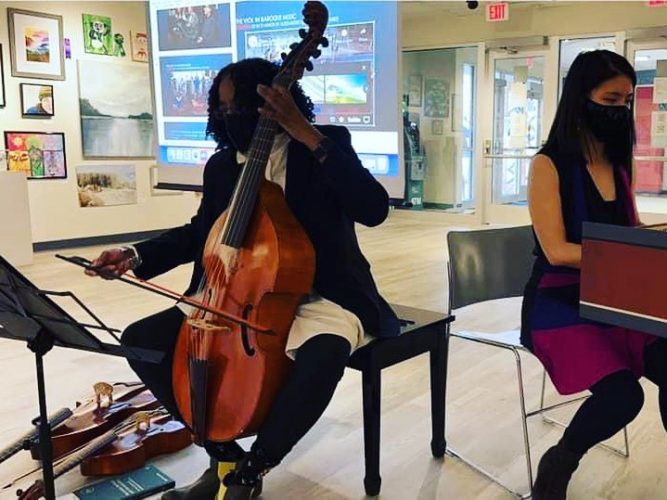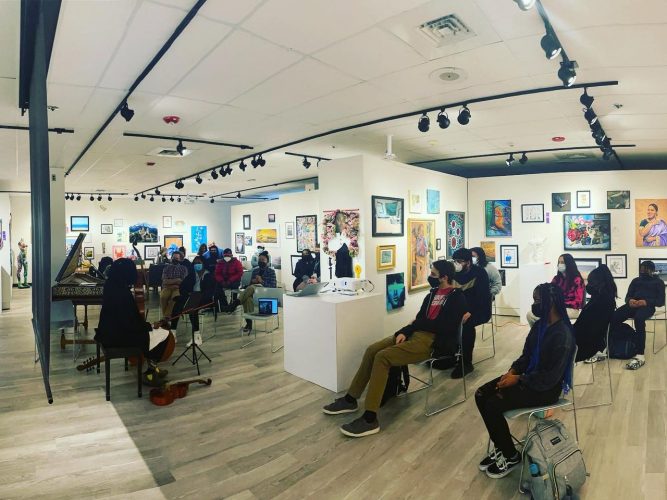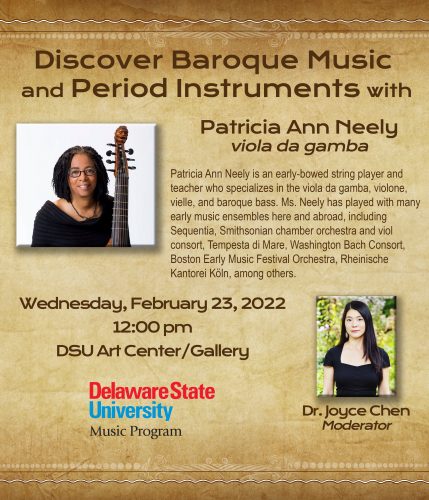
On February 23, celebrating Black History Month, two Early Music America IDEA Taskforce members—Dr. Joyce Chen and Patricia Ann Neely—gave an engaging demonstration on the history of the viola da gamba and Baroque performance practice at Delaware State University, in Dover, one of 107 HBCUs (Historically Black Colleges and Universities) in the United States.
This was the inaugural event of the HBCU Early Music Initiative, presented to a diverse group of community members and students, including non-majors taking Intro to Music courses and music majors who are planning to pursue graduate degrees. The attendees shared much positive feedback:
“Thank you so much for bringing early music to this campus! I have been hoping to learn more about Baroque music, but we do not have an orchestra or harpsichords here. It was important [to witness this project] and I felt privileged to see a Baroque music demonstration at an HBCU, which is rare,” said Rashawn King, a graduating senior. “It’s great to listen to this music come alive after learning about it in class with recordings and textbooks.”

About the HBCU Early Music Initiative from Dr. Joyce Chen:
I am currently an adjunct professor at Delaware State University. As an aspiring pedagogue and activist in the early-music field, I wanted to bring early music to this campus, where there has not been an established early-music program. I brought my harpsichord and played it for several faculty recitals in Fall 2021, where students and community members showed a tremendous amount of curiosity and enthusiasm. In addition to performances, I was also asked to demonstrate performance practice and realization of figured bass in a music theory course. By bringing performance and theory together, I observe that there is not only a higher level of engagement among students but, most importantly, a need for early-music outreach opportunities at this under-served area.
I pitched the idea of a pilot program of bringing early music to HBCUs to Early Music America’s IDEA Taskforce (for which I serve as a member since 2020) and Princeton University (where I am currently pursuing a second doctorate in Historical Musicology). Princeton’s GradFutures, a professional development program, awarded me the Social Impact Fellowship and provided me mentorship, support, and funding to develop, coordinate, and tailor a program that best suit the students and the community of Delaware State University. Early Music America’s IDEA Taskforce, co-chaired by Karin Cuellar and Breana McCullough, has graciously sponsored several guest performers for the program as well.
I hope to strategize a sustainable model for implementing a similar program for other HBCUs or higher education institutions that have not yet had similar offerings.
 The music program at Delaware State University currently is divided among vocal students and instrumental students (mostly brass and woodwinds). Even though performance practice on period instruments may not be immediately applicable for the students, topics such as rhetorical figures, ornamentation, and articulation will inform students to approach baroque repertoire—even a transcription of modern brass quintets, for example—with a fresh ideas and interpretation.
The music program at Delaware State University currently is divided among vocal students and instrumental students (mostly brass and woodwinds). Even though performance practice on period instruments may not be immediately applicable for the students, topics such as rhetorical figures, ornamentation, and articulation will inform students to approach baroque repertoire—even a transcription of modern brass quintets, for example—with a fresh ideas and interpretation.
To provide well-rounded perspectives on baroque music, I have invited four guest artists—Patricia Ann Neely, Jean Bernard Cerin, Eileen Grycky, and Natalie Kress—who will each showcase their instruments or voice. They will also make joint presentations with me on a variety of subjects, including ornamentation, affect/rhetoric, and improvisation.
I hope that these events and lectures will be a good introduction for DSU students and community members for raising awareness about Baroque music. Aligning with the EMA IDEA Taskforce mission statement, we hope to make early music more inclusive, accessible, diverse and equitable.
We welcome ideas and feedback on making this project sustainable and reaching out to more HBCUs and other higher education institutions. For graduate students who are interested in participating in this project, please reach out to the IDEA Taskforce or Dr. Joyce Chen: joyce.chen@princeton.edu

